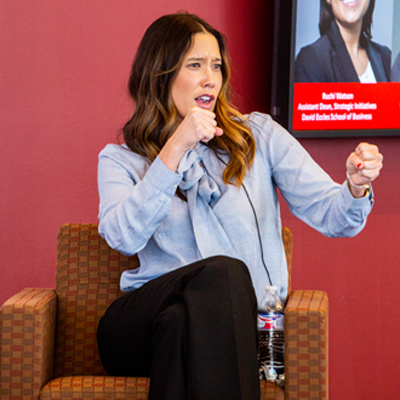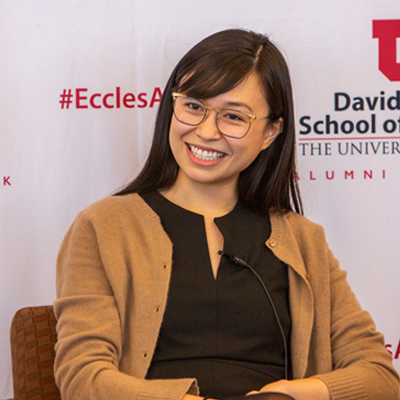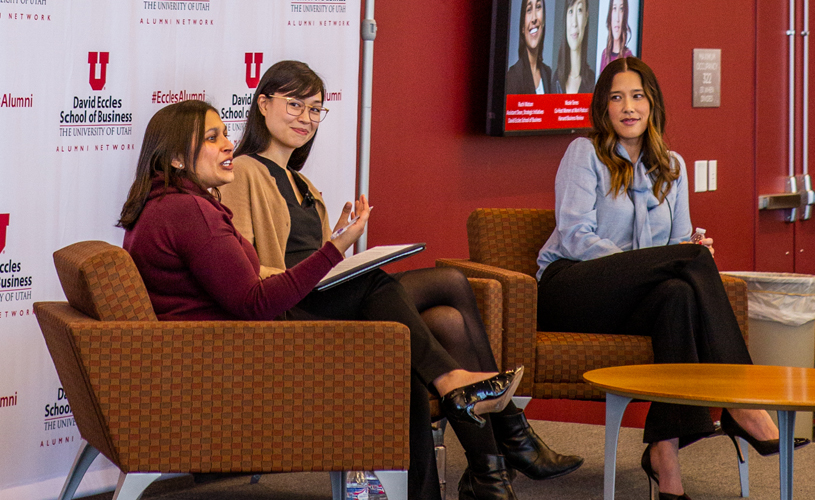at the University of Utah
Women in the Workplace: Challenges overcome and strategies for success
The power of women and their influence in the business workforce is only growing stronger, as evidenced by three women panelists at the David Eccles School of Business Women in Business spring luncheon.
Moderated by Eccles School Assistant Dean Ruchi Watson, panelists Nicole Torres, senior associate editor at Harvard Business Review and co-host of HBR’s Women at Work podcast, and Lianna Kinard, vice president of marketing at Buckner Insurance, talked through challenges they’ve overcome as minorities in business as well as the research behind women’s issues. Their consensus? There can be an advantage to being a woman in business, especially in Utah. The panel illustrated this through stories of reframing self-thoughts, carefully researching and influencing companies, differentiating sponsorship and mentorship, and improving diversity initiatives.

Lianna Kinard, Vice President of Marketing, Buckner Insurance
Reframing Self-Thoughts
“It’s an advantage to be a woman in business in Utah, because the competition isn’t quite as high,” Kinard said. Reframing thoughts in a positive light, such as positioning yourself as unique and having a fresh perspective compared to the majority, is one way the panelists offered to implement a new way of thinking.
Researching and Influencing Companies
Watson mentioned that child care allows both women and men to go to work, so it seems like a topic companies should care about. The panelists agreed and noted which positions they’ve held that offered benefits, child care or otherwise, that showed support for working parents. Kinard honed in on her choice to work for Buckner Insurance, saying her top priorities when choosing a company are work-life balance and respect for her family life. She advised the audience that, from her experience, once you find a company that matches your priorities, the money and titles will come.
During the course of the event, the idea of certain needs and wants at work were broached, including paid parental leave, non-traditional work schedules, wellness programs, and flexibility for self-care. Kinard’s advice in getting your company on board for these benefits is to ask for them. “Put out feelers [to other employees]. If there are enough people who want [a certain benefit], the company might see it as a perk and offer it,” she said. Through asking superiors and surveying colleagues, Kinard has been successful in influencing her company to add benefits both to certain teams and throughout the company.
Sponsorship vs. Mentorship
As an audience member asked about programs for formal mentorship for women, Torres reminded the group of the differences between mentorship and sponsorship. “A sponsor is someone who can advocate for you to get high-profile assignments, promotions, and raises,” Torres said. “It’s totally different from a mentor.” Noting that both mentors and sponsors are important throughout a career, Watson emphasized that leaders also need to be thinking about these roles, including actively trying to sponsor up-and-coming employees and communicating with other leaders about sponsorship ideas and best practices.

Nicole Torres, Senior Associate Editor, Harvard Business Review, Co-Host, Women at Work Podcast

Ruchi Watson, Assistant Dean, David Eccles School of Business
Improving Diversity Initiatives
The panel wrapped up with comments on company diversity initiatives and programs. Torres pointed to current research that indicates, “Many times, [diversity] policies or programs in place don’t match up with what employees want and need.” Her recommendation is for companies to communicate with employees, ask what they need, and adjust the initiatives to match the needs. Watson added, “Making sure everyone has a voice and that all perspectives are heard is a facet of high-performing teams, not just a part of diversity programs.” The panel agreed; integrating diversity throughout the company, not just in specific initiatives or instances, is valuable to everyone.
The panelists at the David Eccles School of Business Women in Business Spring Luncheon found similarities in experiences through different perspectives. The women agreed there’s power in reframing self-thoughts, it’s important to research and then influence the companies you work for, there’s a difference between sponsorship and mentorship, and diversity programs may not be reaching the needs they think they are. Themes of confidence, “ask for it”, and authenticity were shared in their advice to women students, professionals, senior leaders, and up-and-comers.





